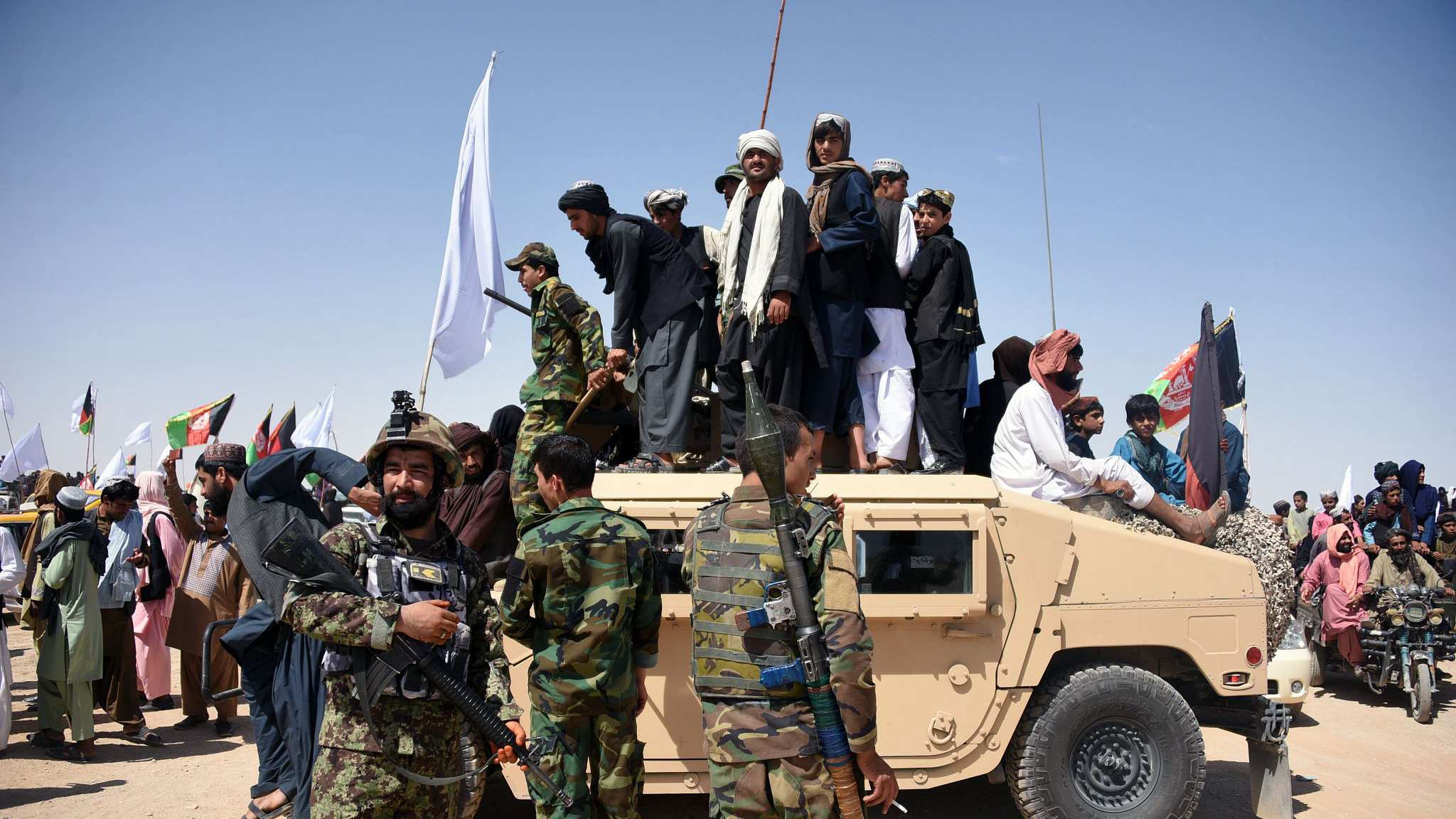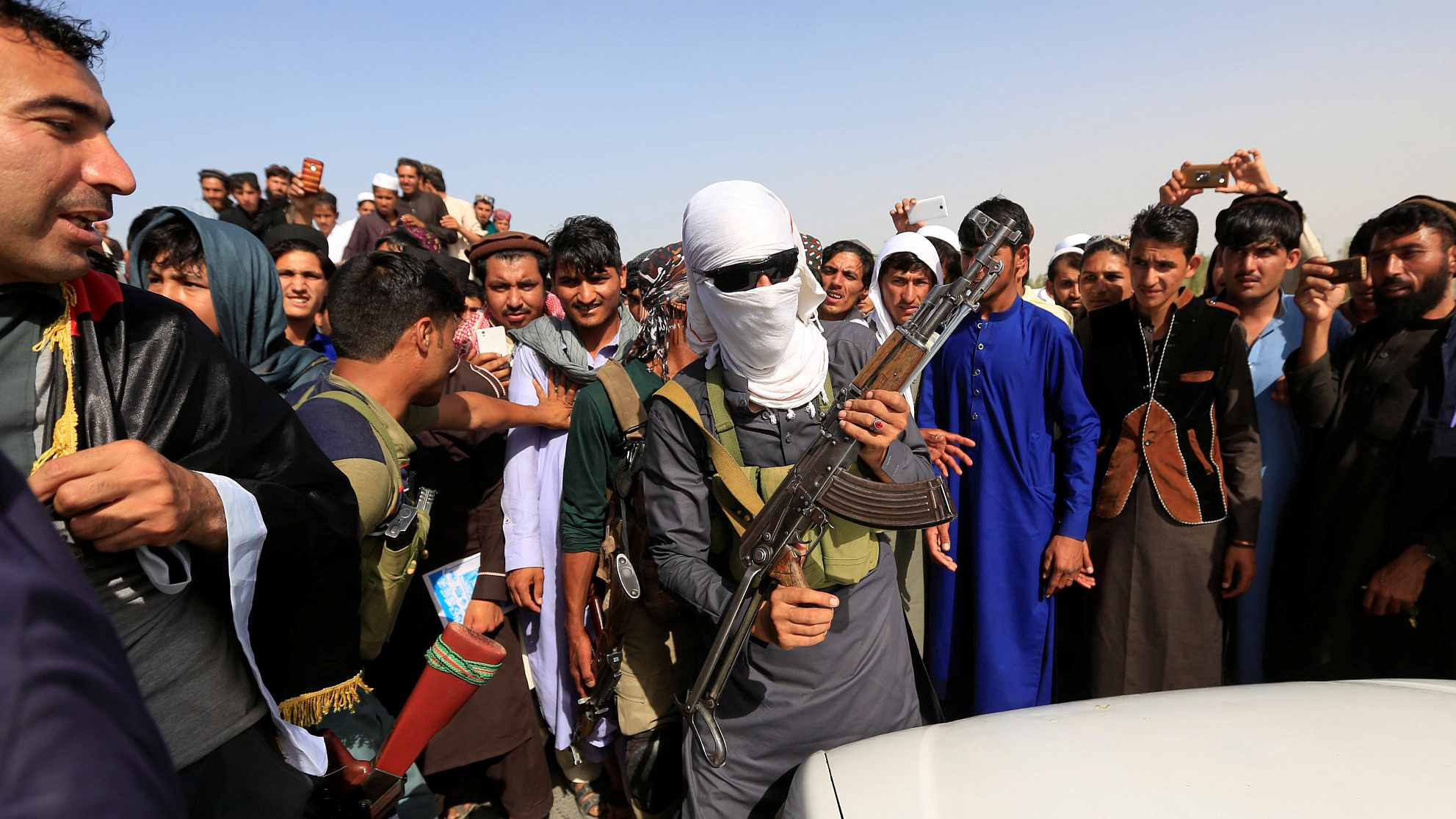
Afghan Taliban militants and residents stand on an armored Humvee vehicle of the Afghan National Army, June 17, 2018. /VCG Photo
Afghan Taliban militants and residents stand on an armored Humvee vehicle of the Afghan National Army, June 17, 2018. /VCG Photo
Editor's note: Hamzah Rifaat Hussain is a former visiting fellow at the Stimson Center in Washington, and currently serves as assistant researcher at the Islamabad Policy Research Institute (IPRI) in Pakistan. The article reflects the author's opinions, not necessarily the views of CGTN.
Afghanistan's two main political rivals plan on holding parallel inauguration ceremonies with President Ashraf Ghani's main opponent, Abdullah Abdullah questioning the legitimacy of the results of the Presidential elections of 2019.
This development comes days after an attack on Abdullah at a ceremony in Kabul which commemorated the death of a Shia leader. Abdullah escaped unharmed but 32 casualties were reported and ISIL claimed responsibility for the attack.
The unfolding of these events underlines how tenuous the post Doha peace deal process is in Afghanistan, where considerable optimism expressed by the Trump administration negates on ground realities which require further attention.
The earlier call to resume violence by the Taliban after the deal was struck is one of the many challenges that Afghanistan confronts currently. Factors such as subsequent power sharing arrangements with the Taliban, the diversity of stakeholders involved in the dialogue process and coalitions vying for influence after the U.S. withdrawal within 14 months entails that peace and stability in the country will be subject to addressing these key concerns.
Everlasting peace lies less in striking a deal with a key player such as the Taliban in Doha and more about being cognizant of whether one group would abide by terms and conditions of the peace deal. This skepticism is well founded given that this has been expressed by American Intelligence officials themselves.
From a U.S. perspective, this deal comes within touching distance of the upcoming U.S. presidential elections of 2020 and Donald Trump's long held promise that U.S. troop withdrawal will materialize is the key variable.
The second stakeholder of the Doha peace deal is the Taliban which since waging war against NATO troops in Afghanistan in 2001 has failed to transform itself into a proper political entity which is amenable towards dialogue. It continues to assume the status of a Sunni Islamist Deobandi movement and has failed to integrate itself into the political mainstream.
The Taliban question needs to be addressed by exploring a wide range of options, including offering a significant chunk of representation in the Afghan security forces set up, ensuring that they play a greater role in policy making at the center in Kabul or having the ability to negotiate the mechanics for a future Afghan set up which would be acceptable to them and all stakeholders involved.

A Taliban member (C) celebrates ceasefire with people in Rodat district of Nangarhar province, Afghanistan, June 16, 2018. /VCG Photo
A Taliban member (C) celebrates ceasefire with people in Rodat district of Nangarhar province, Afghanistan, June 16, 2018. /VCG Photo
That challenge is augmented by the very fact that different ethnic groups within the country, particularly those who formed an integral component of the Northern Alliance since its reformation in 2011, are likely to resist power sharing arrangements which overtly accommodate the Taliban.
This resistance could center on a sense of grievance over resources or concessions on territorial grounds. The 2015 Bamako Agreement in Mali is an example, where the concept of mixed patrols with state security, pro- government forces and rebels being accommodated resulted in difficulties and differences centered on territorial control and profiteering.
The prospect of equal representation of all factions at the negotiating table with international forces being guarantors could, hence, be hijacked by calls for great shares by ethnic groups opposed to the Taliban such as the Tajiks and the Uzbeks in the country.
Along with the milieu of diverse ethnic groups is the role of the Hizb I Islami or Gulbuddin Hekmatyar's faction which has been negated by the Trump administration while inking the peace agreement with the Taliban in Doha.
It has been reported that Hekmatyar has become closer to the Ashraf Ghani administration over time. The group recently slammed the Taliban as a fanatical group and has issues over their violent tactics which came to the fore just days after the peace deal was struck.
To assume that Hizb I Islami and the Taliban would be on the same page is a fallacy given the former's long standing desire for a unified Islamic state which is at odds with the more tribal-oriented Taliban.
As off current, the Taliban does not have any representation in the provincial councils in Afghanistan but at the Moscow Conference of 2018, the group pushed for demanding a new constitution which would be acceptable to all Afghan citizens.
In Moscow, the ownership of the political process instead of substantial issues such as women's rights or the role of education in the country was central to the Taliban's priorities in any political arrangement.
The subject of interim security solutions continue to be unaddressed which could enable Taliban to demobilize and become an active part in the Afghan security set up or an integral component of the transitional security militias and joint integrated units as was the case in the 2005 Sudanese Comprehensive Peace Agreement.
Notably however, the Sudanese case does not address questions of territorial autonomy in a country where diverse ethnic groups are vying for influence and solely dealt with the Sudanese People's Liberation Movement only.
Afghanistan descending into chaos would result in a spillover effect on the region with unparalleled consequences especially with the Islamic State assuming a more proactive role. The two political rivals trading barbs is just one sign of difficult times which lie ahead for the people of Afghanistan and their desire for sustainable peace.
(If you want to contribute and have specific expertise, please contact us at opinions@cgtn.com)